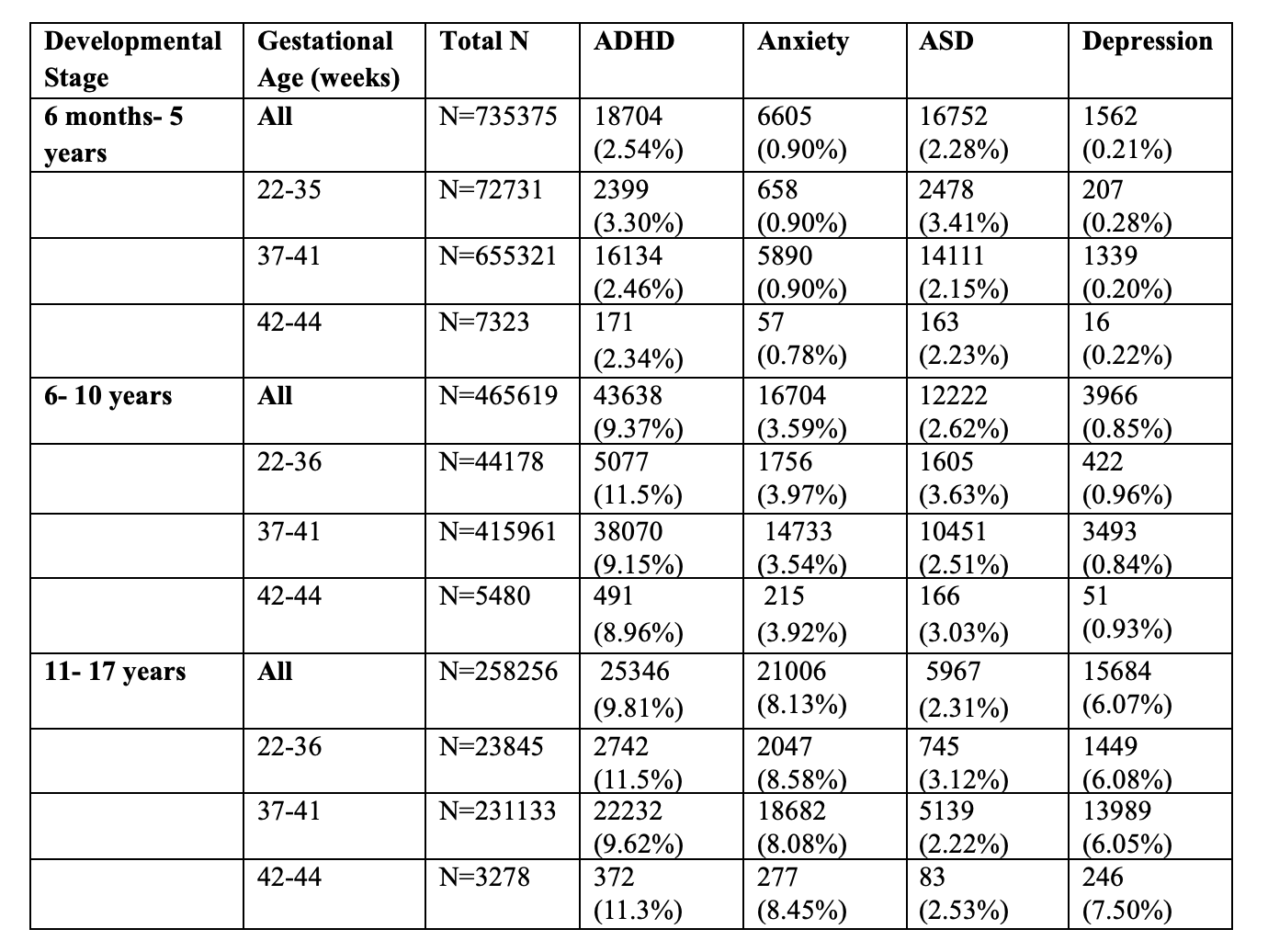Mental Health 2
Session: Mental Health 2
777 - Mental Health and Developmental Outcomes Across Developmental Stages in Children Born Preterm, Full-Term, and Post-Term: A Population-Based Cohort Study
Saturday, April 26, 2025
2:30pm - 4:45pm HST
Publication Number: 777.5933
Alyssa Wilkins, University of Alberta Faculty of Medicine and Dentistry, Edmonton, AB, Canada; Halimat O. Ibrahim, University of Alberta Faculty of Medicine and Dentistry, Edmonton, AB, Canada; YE SHEN, BC Children's Hospital Research Institute, Richmond, BC, Canada; Sumera Aziz, University of Alberta Faculty of Medicine and Dentistry, Edmonton, AB, Canada; Jeffrey N.. Bone, BC Children's Hosiptal Research Institute, Vancouver, BC, Canada; sarka Lisonkova, UBC, Vancouver, BC, Canada; Lindsay Richter, University of British Columbia, Vancouver, BC, Canada; Natalie H. Chan, University of California, San Francisco, San Francisco, CA, United States; Joseph Ting, University of Alberta, Edmonton, AB, Canada

Alyssa Wilkins, BSc (she/her/hers)
Medical Student
University of Alberta Faculty of Medicine and Dentistry
Edmonton, Alberta, Canada
Presenting Author(s)
Background: Evidence has consistently shown that adult survivors of preterm birth have increased risks of chronic disorders. Preterm birth interrupts normal brain development during a period of rapid growth and may increase lifelong susceptibility to psychiatric and developmental conditions. However, there is a paucity of large population cohorts studying mental health and developmental outcomes during childhood and adolescence among preterm survivors.
Objective: To investigate and compare the prevalence of common mental health and developmental conditions by gestational age within three developmental age groups.
Design/Methods: This retrospective cohort study analyzed data from Population Data BC, focusing on infants born between 22- and 44-weeks gestational age from April 2004 to March 2022. The four most common diagnoses—attention-deficit/hyperactivity disorder (ADHD), anxiety, autism spectrum disorder (ASD), and depression—were sourced from inpatient and outpatient databases, including the Discharge Abstract Database and the National Ambulatory Care Reporting System, allowing comparisons across gestational age groups.
Results: This cohort study included 779,010 live births and examined the prevalence of common mental health and developmental conditions across 6 months to 5 years, 6 to 10 years, and 11 to 17 years. [Table 1] Children born preterm exhibited higher prevalence rates of ADHD and ASD across all age groups compared to their term counterparts [Table 2]. In early childhood, the prevalence of ASD among preterm children was approximately 1.6 times greater than that of term children, with elevated rates continuing throughout childhood. Anxiety prevalence increased with age, particularly among preterm children, who demonstrated consistently higher rates across all age groups. Depression showed a marked increase in adolescence, particularly for preterm and post-term births. While children born post-term (42-44 weeks) generally exhibited lower rates, the adolescent group displayed increased rates of ADHD and depression, indicating potential risks that may emerge later in childhood.
Conclusion(s): These findings highlight gestational age as a key factor influencing mental health and developmental trajectories, with preterm births demonstrating elevated risks for ADHD, ASD, and anxiety across developmental stages. This emphasizes the need for targeted early mental health and developmental monitoring and intervention for preterm populations to address risks persisting into adolescence. Additionally, children born post-term may require closer observation during adolescence due to rising rates of ADHD and depression.
Table 1 Prevalence of Mental Health Diagnoses by Gestational Age

Table 2 Prevalence of Mental Health Diagnoses by Gestational Age and Developmental Stage


